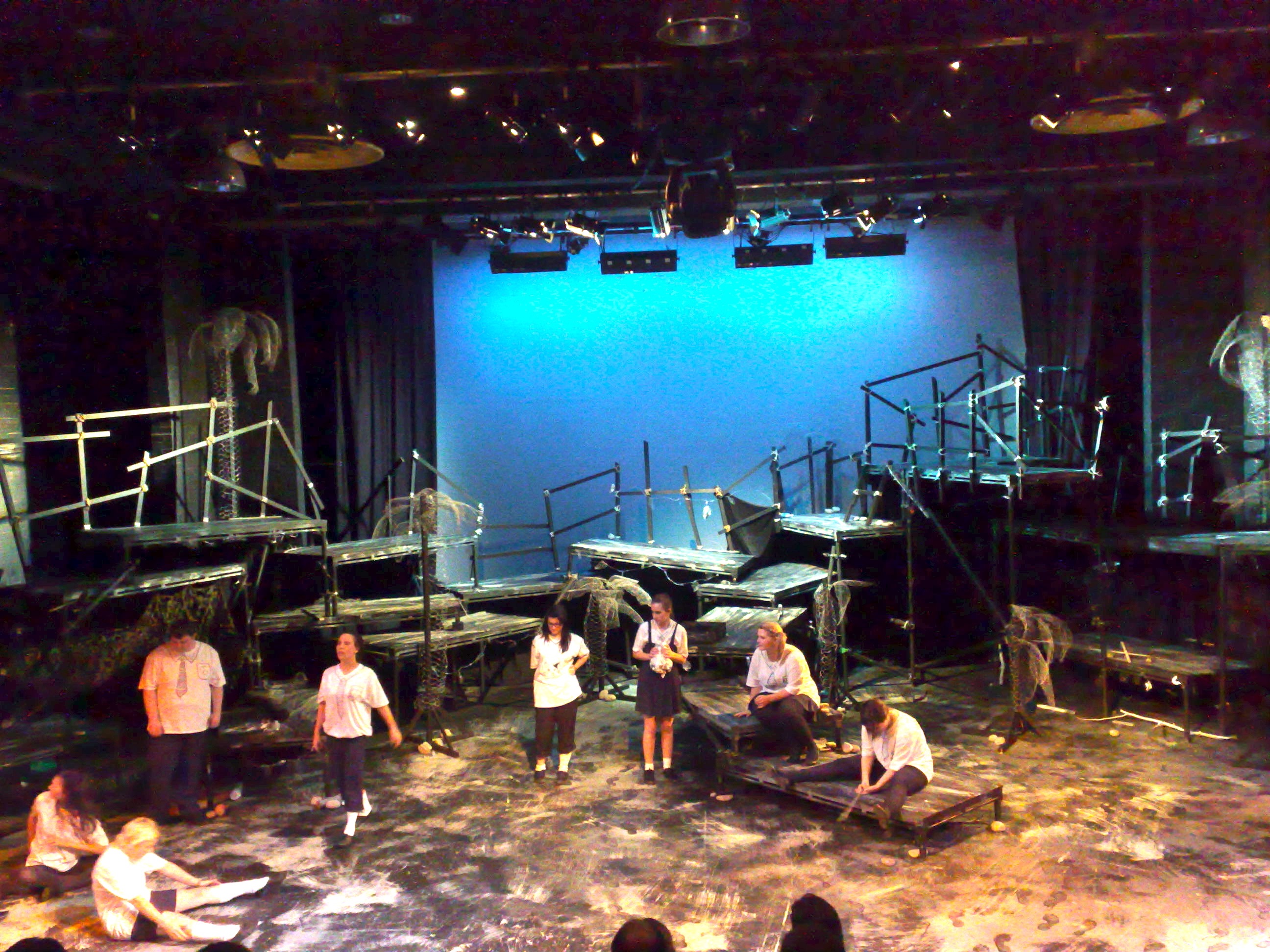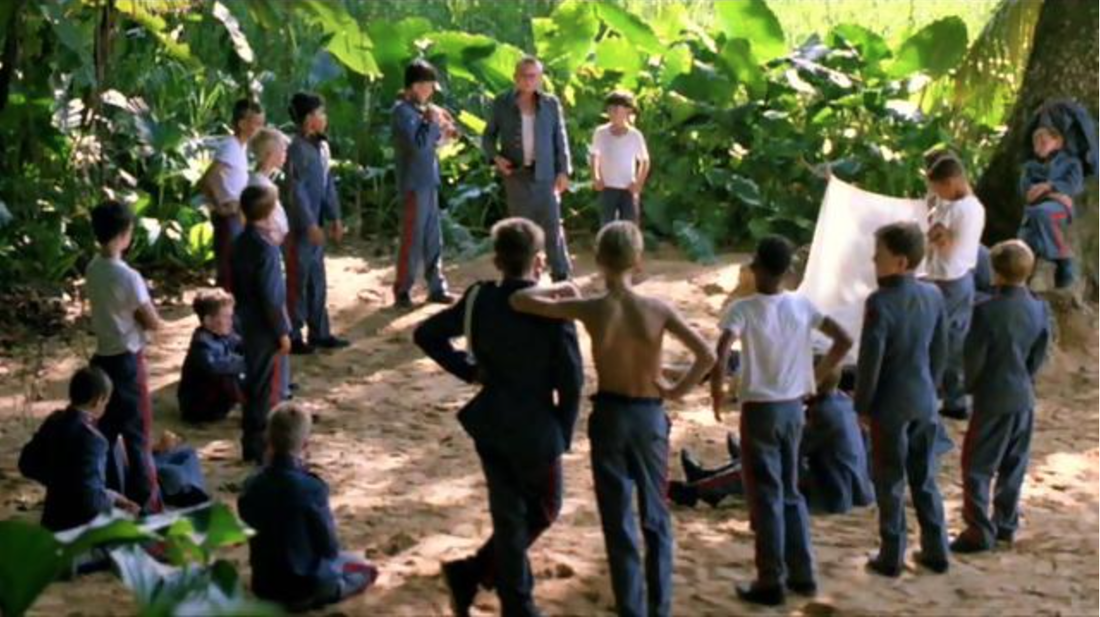Lord Of The Flies Stage Play: A Comprehensive Guide To Its Impact, Themes, And Production
William Golding's "Lord of the Flies" has been adapted into a stage play countless times, captivating audiences worldwide with its exploration of human nature, survival, and morality. The play delves into the complexities of societal breakdown and the inherent darkness within every individual. As one of the most iconic literary works of the 20th century, it continues to resonate with audiences of all ages.
Since its publication in 1954, "Lord of the Flies" has inspired numerous adaptations, including theatrical productions. These stage plays bring the novel's raw emotions and themes to life, offering a fresh perspective on the timeless story of a group of boys stranded on a deserted island. The play not only entertains but also provokes deep thought about humanity's capacity for both good and evil.
From its gripping narrative to its powerful symbolism, the "Lord of the Flies" stage play has become a staple in theaters around the globe. This article will explore the intricacies of the play, its themes, production history, and its lasting impact on audiences. Whether you're a fan of the novel or simply interested in theater, this guide will provide valuable insights into the world of "Lord of the Flies" on stage.
Read also:Llama Wedding A Unique And Memorable Celebration
Table of Contents
- Introduction to the Lord of the Flies Stage Play
- Exploring the Key Themes in the Play
- A Brief History of Lord of the Flies Adaptations
- Symbolism in the Lord of the Flies Stage Play
- Production Challenges and Innovations
- Roles and Characters in the Play
- Audience Reception and Impact
- Critical Analysis and Reception
- The Play's Role in Education
- Future of Lord of the Flies Stage Plays
Introduction to the Lord of the Flies Stage Play
The "Lord of the Flies" stage play is an adaptation of William Golding's classic novel, bringing its powerful story to life on the theater stage. The play follows a group of boys who find themselves stranded on a deserted island after a plane crash. As they struggle to survive, the boys' initial attempts at creating order gradually descend into chaos, highlighting the darker aspects of human nature.
One of the most striking features of the stage play is its ability to convey the novel's themes through visual storytelling. Unlike the book, which relies heavily on internal monologues and descriptive prose, the play uses dialogue, staging, and props to create a vivid depiction of the boys' journey. This adaptation allows audiences to experience the story in a more immersive way, making it an ideal choice for theater enthusiasts.
Why the Stage Play Stands Out
The "Lord of the Flies" stage play stands out due to its unique approach to character development and thematic exploration. The play emphasizes the psychological tension between the characters, particularly the conflict between Ralph and Jack, as they vie for leadership. This dynamic is further enhanced by the use of symbolism, such as the conch shell and the pig's head, which serve as powerful visual metaphors.
Exploring the Key Themes in the Play
The "Lord of the Flies" stage play is rich in themes that continue to resonate with audiences today. At its core, the play examines the struggle between civilization and savagery, highlighting the fragility of societal structures. As the boys attempt to govern themselves, their initial efforts at democracy give way to authoritarianism, reflecting the darker side of human nature.
Themes of Survival and Morality
- Survival: The play explores the boys' efforts to survive in a harsh environment, emphasizing the importance of cooperation and resourcefulness.
- Human Nature: It delves into the inherent darkness within every individual, questioning whether humans are naturally inclined toward good or evil.
- Power and Authority: The struggle for power between Ralph and Jack illustrates the dangers of unchecked authority and the potential for corruption.
A Brief History of Lord of the Flies Adaptations
Since its publication, "Lord of the Flies" has been adapted into various forms, including films, radio dramas, and stage plays. The first stage adaptation premiered in the 1960s, with subsequent productions gaining popularity in the 1990s and beyond. Each adaptation brings its own unique interpretation of the story, while maintaining the novel's core themes and messages.
Notable Productions
Some of the most notable "Lord of the Flies" stage productions include:
Read also:Gigi Hadids Short Hair Transformation A Bold And Stylish Move
- The 1963 adaptation by Nigel Williams, which received critical acclaim for its faithful rendition of the novel.
- The 1995 Broadway production, which incorporated innovative staging techniques to enhance the play's impact.
- Modern adaptations that incorporate multimedia elements, such as projections and soundscapes, to create a more immersive experience.
Symbolism in the Lord of the Flies Stage Play
Symbolism plays a crucial role in the "Lord of the Flies" stage play, enhancing its thematic depth and visual appeal. Key symbols include:
- The Conch Shell: Representing order and democracy, the conch shell serves as a symbol of the boys' initial attempts to create a civilized society.
- The Pig's Head: Known as the "Lord of the Flies," this symbol represents the darker aspects of human nature and the boys' descent into savagery.
- Fire: Fire symbolizes hope and survival, but also destruction and chaos, highlighting the dual nature of human actions.
Production Challenges and Innovations
Producing the "Lord of the Flies" stage play presents several challenges, including casting, set design, and special effects. Directors must carefully balance the play's intense emotional moments with its visual spectacle, ensuring that the audience remains engaged throughout the performance. Innovations in technology have allowed modern productions to incorporate advanced lighting, sound, and projection techniques, enhancing the play's impact.
Casting and Character Development
One of the most significant challenges in producing the play is casting the right actors to portray the boys. Directors must select young performers who can convincingly convey the characters' emotional journeys while maintaining the play's authenticity. Additionally, character development is crucial, as each boy represents a different aspect of human nature, contributing to the overall narrative.
Roles and Characters in the Play
The "Lord of the Flies" stage play features a diverse cast of characters, each with their own distinct personality and role in the story. Key characters include:
- Ralph: The protagonist, Ralph represents leadership, order, and civilization.
- Jack: Jack embodies the opposite of Ralph, symbolizing chaos, savagery, and power.
- Piggy: Piggy serves as the voice of reason and intellect, often marginalized by the other boys.
- Simon: Simon represents spirituality and empathy, offering a deeper understanding of the boys' situation.
Audience Reception and Impact
The "Lord of the Flies" stage play has consistently captivated audiences with its powerful storytelling and thought-provoking themes. Audiences of all ages appreciate the play's ability to address universal issues such as survival, morality, and human nature. Many viewers leave the theater reflecting on the implications of the story, questioning their own beliefs and values.
Engaging Young Audiences
One of the play's strengths is its ability to engage younger audiences, who often relate to the characters' struggles and experiences. Schools and theater groups frequently stage productions of "Lord of the Flies" to introduce students to its themes and messages, fostering a deeper understanding of the story's relevance in today's world.
Critical Analysis and Reception
Critical reception of the "Lord of the Flies" stage play has been overwhelmingly positive, with many praising its ability to bring the novel's complex themes to life. Critics often highlight the play's innovative use of symbolism and its powerful exploration of human nature. However, some have questioned the play's portrayal of violence and its suitability for younger audiences.
Addressing Controversial Themes
Despite its acclaim, the play's depiction of violence and savagery has sparked debate among critics and audiences alike. Proponents argue that these elements are essential to the story's message, while detractors believe they may be too intense for certain viewers. Directors must carefully consider these concerns when staging the play, ensuring that it remains accessible and impactful for all audiences.
The Play's Role in Education
The "Lord of the Flies" stage play has become an integral part of many educational curricula, offering students a unique perspective on the novel's themes and characters. Teachers often use the play to facilitate discussions about morality, human nature, and societal structures, encouraging students to think critically about these issues. Additionally, staging the play in schools provides valuable hands-on experience for students interested in theater and performance.
Future of Lord of the Flies Stage Plays
As interest in "Lord of the Flies" continues to grow, the stage play is likely to remain a popular choice for theaters and schools worldwide. Future adaptations may incorporate new technologies and staging techniques, further enhancing the play's impact and appeal. By addressing timeless themes and exploring the complexities of human nature, the "Lord of the Flies" stage play will undoubtedly continue to captivate audiences for generations to come.
Innovations in Technology
Advances in technology, such as virtual reality and augmented reality, may offer new opportunities for staging "Lord of the Flies" in innovative ways. These technologies could allow audiences to experience the play in immersive environments, further enhancing its emotional and thematic impact. As the theater industry evolves, the possibilities for adapting this classic story are virtually limitless.
Conclusion
The "Lord of the Flies" stage play remains a powerful and thought-provoking adaptation of William Golding's iconic novel. Through its exploration of themes such as survival, morality, and human nature, the play continues to resonate with audiences worldwide. By addressing universal issues and offering a fresh perspective on the novel's story, the stage play ensures that "Lord of the Flies" remains relevant in today's world.
We invite you to share your thoughts and experiences with the "Lord of the Flies" stage play in the comments section below. Have you seen a production of the play? What did you think of its themes and staging? Additionally, explore other articles on our site for more insights into theater, literature, and the arts. Together, let's continue the conversation about this timeless story and its lasting impact on audiences everywhere.


